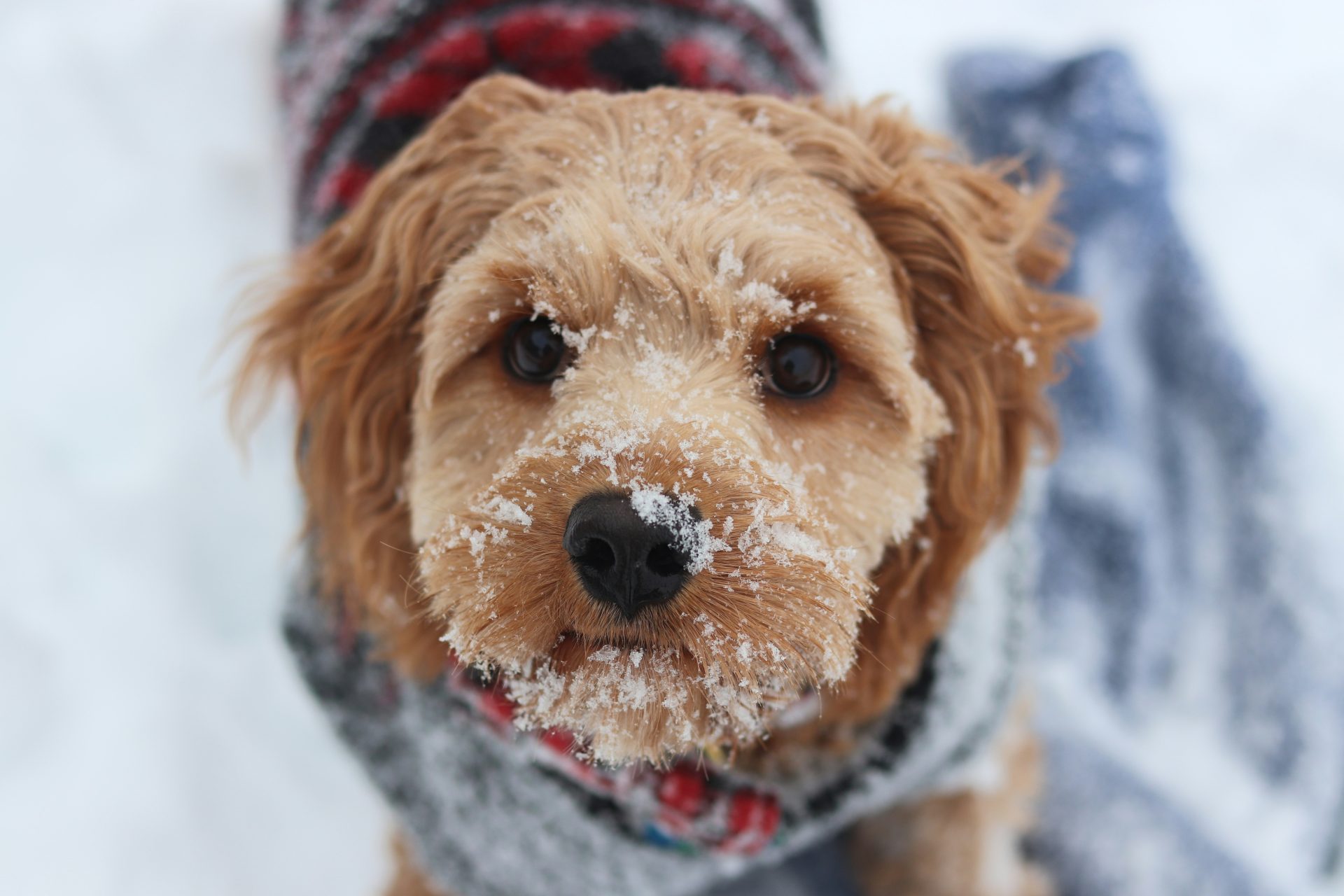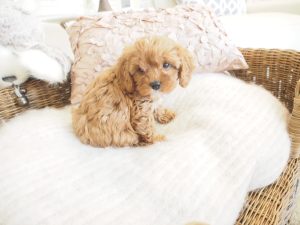Are Cavoodles Biters?
Posted on July 16, 2024

Cavoodles, a captivating mix of Cavalier King Charles Spaniels and Poodles, have captured the hearts of pet enthusiasts worldwide. As their popularity soars, many ponder an essential question: are Cavoodles biters? This article delves into the biting behavior of Cavoodles, examining the factors shaping their temperament and offering practical advice for both potential and current Cavoodle owners.
Understanding Cavoodle Temperament
Typical Temperament of Cavoodles
Cavoodles exude a gentle, affectionate demeanor. They blend traits from their parent breeds, merging the Cavalier King Charles Spaniel’s sociability with the Poodle’s intelligence. These dogs frequently display warmth, playfulness, and an ardent desire for human companionship, making them excellent pets.
Influence of Parent Breeds
The temperament of a Cavoodle stems from both the Cavalier King Charles Spaniel and the Poodle. Cavaliers are renowned for their loving and friendly nature, while Poodles are sharp and easily trained. This blend generally produces a Cavoodle that is both sociable and obedient.
Factors Influencing Biting Behavior
Genetic Factors
Inherited traits from parent breeds can impact a Cavoodle’s behavior. While Cavaliers and Poodles are not typically aggressive, individual dogs may inherit specific traits influencing their temperament, including a potential for biting.
Socialization
Early socialization is pivotal in curbing biting behavior. Introducing Cavoodles to various people, animals, and environments fosters confidence and diminishes fear-based reactions leading to biting. Techniques for effective socialization include regular interactions with other dogs and supervised playdates with children.
Training
Proper training can significantly deter biting. Positive reinforcement techniques, such as rewarding good behavior with treats and praise, prove effective. Teaching commands like “no” and “leave it” helps manage and prevent biting incidents.
Environment
A Cavoodle’s living environment molds its behavior. A safe, secure, and stimulating environment reduces stress and anxiety, which can lead to biting. Providing ample toys, regular exercise, and a comfortable living space contributes to a well-behaved Cavoodle.
Common Triggers for Biting
Identifying Situations Leading to Biting
Certain situations may trigger biting in Cavoodles. These include fear, anxiety, and unfamiliar or threatening environments. Recognizing signs of discomfort, such as growling, cowering, or showing teeth, can prevent biting incidents.
Managing and Preventing Biting Incidents
To manage biting behavior, owners should remain calm and avoid physical punishment, which can exacerbate the issue. Redirecting the dog’s attention to a toy or command and rewarding calm behavior proves effective. In severe cases, seeking professional help from a veterinarian or dog behaviorist may be necessary.
Handling Biting Incidents
Steps to Take if a Cavoodle Bites
If a Cavoodle bites, immediate action is necessary. Safely separate the dog from the situation without causing further stress. Assess the situation to understand the trigger and take steps to prevent future occurrences. Consistency in training and environment management is key to addressing biting behavior.
When to Seek Professional Help
In cases where biting behavior persists or escalates, seeking help from a veterinarian or professional dog behaviorist is recommended. These experts can provide tailored advice and training plans to address the underlying issues causing the biting.
Myth-Busting
Debunking Common Myths
Some myths suggest that Cavoodles are prone to biting due to their small size or perceived fragility. However, with proper socialization, training, and care, Cavoodles can be gentle and well-behaved. Real-life examples and expert opinions support the view that Cavoodles, like any breed, require responsible ownership to prevent biting behavior.
Practical Tips for Owners
Daily Practices for a Well-Behaved Cavoodle
Consistency and patience are crucial in training a Cavoodle. Daily practices include regular socialization, positive reinforcement training, and maintaining a stable environment. Providing mental and physical stimulation through play and exercise helps reduce anxiety and prevent biting.
Resources for Further Reading and Support
For more information on Cavoodle behavior and training, consider resources such as books, online forums like Cavoodle Oodle Community Australia, and local training classes. Connecting with other Cavoodle owners can provide valuable insights and support.
Conclusion
In conclusion, while Cavoodles are generally known for their gentle and friendly nature, various factors can influence their tendency to bite. Understanding these factors and taking proactive steps in socialization, training, and environment management can help ensure a well-behaved and happy Cavoodle. By addressing potential triggers and handling incidents appropriately, Cavoodle owners can enjoy a loving and bite-free relationship with their furry friends.
Facebook Twitter Reddit
Cavoodles, a captivating mix of Cavalier King Charles Spaniels and Poodles, have captured the hearts of pet enthusiasts worldwide. As their popularity soars, many ponder an essential question: are Cavoodles biters? This article delves into the biting behavior of Cavoodles, examining the factors shaping their temperament and offering practical advice for both potential and current Cavoodle owners.
Understanding Cavoodle Temperament
Typical Temperament of Cavoodles
Cavoodles exude a gentle, affectionate demeanor. They blend traits from their parent breeds, merging the Cavalier King Charles Spaniel’s sociability with the Poodle’s intelligence. These dogs frequently display warmth, playfulness, and an ardent desire for human companionship, making them excellent pets.
Influence of Parent Breeds
The temperament of a Cavoodle stems from both the Cavalier King Charles Spaniel and the Poodle. Cavaliers are renowned for their loving and friendly nature, while Poodles are sharp and easily trained. This blend generally produces a Cavoodle that is both sociable and obedient.
Factors Influencing Biting Behavior
Genetic Factors
Inherited traits from parent breeds can impact a Cavoodle’s behavior. While Cavaliers and Poodles are not typically aggressive, individual dogs may inherit specific traits influencing their temperament, including a potential for biting.
Socialization
Early socialization is pivotal in curbing biting behavior. Introducing Cavoodles to various people, animals, and environments fosters confidence and diminishes fear-based reactions leading to biting. Techniques for effective socialization include regular interactions with other dogs and supervised playdates with children.
Training
Proper training can significantly deter biting. Positive reinforcement techniques, such as rewarding good behavior with treats and praise, prove effective. Teaching commands like “no” and “leave it” helps manage and prevent biting incidents.
Environment
A Cavoodle’s living environment molds its behavior. A safe, secure, and stimulating environment reduces stress and anxiety, which can lead to biting. Providing ample toys, regular exercise, and a comfortable living space contributes to a well-behaved Cavoodle.
Common Triggers for Biting
Identifying Situations Leading to Biting
Certain situations may trigger biting in Cavoodles. These include fear, anxiety, and unfamiliar or threatening environments. Recognizing signs of discomfort, such as growling, cowering, or showing teeth, can prevent biting incidents.
Managing and Preventing Biting Incidents
To manage biting behavior, owners should remain calm and avoid physical punishment, which can exacerbate the issue. Redirecting the dog’s attention to a toy or command and rewarding calm behavior proves effective. In severe cases, seeking professional help from a veterinarian or dog behaviorist may be necessary.
Handling Biting Incidents
Steps to Take if a Cavoodle Bites
If a Cavoodle bites, immediate action is necessary. Safely separate the dog from the situation without causing further stress. Assess the situation to understand the trigger and take steps to prevent future occurrences. Consistency in training and environment management is key to addressing biting behavior.
When to Seek Professional Help
In cases where biting behavior persists or escalates, seeking help from a veterinarian or professional dog behaviorist is recommended. These experts can provide tailored advice and training plans to address the underlying issues causing the biting.
Myth-Busting
Debunking Common Myths
Some myths suggest that Cavoodles are prone to biting due to their small size or perceived fragility. However, with proper socialization, training, and care, Cavoodles can be gentle and well-behaved. Real-life examples and expert opinions support the view that Cavoodles, like any breed, require responsible ownership to prevent biting behavior.
Practical Tips for Owners
Daily Practices for a Well-Behaved Cavoodle
Consistency and patience are crucial in training a Cavoodle. Daily practices include regular socialization, positive reinforcement training, and maintaining a stable environment. Providing mental and physical stimulation through play and exercise helps reduce anxiety and prevent biting.
Resources for Further Reading and Support
For more information on Cavoodle behavior and training, consider resources such as books, online forums like Cavoodle Oodle Community Australia, and local training classes. Connecting with other Cavoodle owners can provide valuable insights and support.
Conclusion
In conclusion, while Cavoodles are generally known for their gentle and friendly nature, various factors can influence their tendency to bite. Understanding these factors and taking proactive steps in socialization, training, and environment management can help ensure a well-behaved and happy Cavoodle. By addressing potential triggers and handling incidents appropriately, Cavoodle owners can enjoy a loving and bite-free relationship with their furry friends.
Cavoodle Toys
-
 Tough Octopus Plush Dog Toy
A$48.99
Tough Octopus Plush Dog Toy
A$48.99
-
 Indestructible Squeaky Plush Dog Toy
A$25.99
Indestructible Squeaky Plush Dog Toy
A$25.99
-
 Pet Octopus-Inspired Plush Toy
A$43.99
Pet Octopus-Inspired Plush Toy
A$43.99
-
 Animal Inspire Plush Toys for Pets
A$33.99
Animal Inspire Plush Toys for Pets
A$33.99
-
 Animal Inspired Plush Chew Toys for Pets
A$30.99
Animal Inspired Plush Chew Toys for Pets
A$30.99
-
 Animal Inspired Plush Dog Toys
A$39.99
Animal Inspired Plush Dog Toys
A$39.99
-
 Adorable Avocado Plush Pet Toy
A$42.99
Adorable Avocado Plush Pet Toy
A$42.99
-
 Bite Resistant Chew Toys for Pets
A$25.99 - A$32.99
Bite Resistant Chew Toys for Pets
A$25.99 - A$32.99
-
 Bite Resistant Donkey Shape Pet Toy
A$59.99
Bite Resistant Donkey Shape Pet Toy
A$59.99
-
 Carrot Inspire Toy for Pets
A$51.99
Carrot Inspire Toy for Pets
A$51.99




